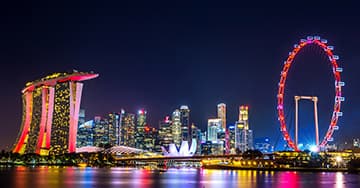How To Set Up A Company In Singapore: A Company Incorporation Guide
Singapore is one of the most ideal destinations for doing business all over the world. Its advantageous strategic location, open economy, low tax rates, and a highly skilled workforce make it attractive for companies looking to incorporate their companies here.
This page aims to offer valuable insights into the essential elements that any business would need to know before setting up a business in Singapore.
Contact Us
Company Incorporation in Singapore
This is an all-inclusive guide to setting up a company in Singapore. Here, you’ll discover detailed information about various aspects of Singapore company registration, encompassing the different types of entities available, the process of forming a company in Singapore and winding up options available.
We also cover essential details to aid you on your journey in Singapore, including maintaining a good compliance rating with the authorities, options for opening a corporate bank account in Singapore, and more.
Even after successfully incorporating your company in Singapore, it’s crucial to stay updated on post-incorporation considerations and ongoing compliance requirements relevant to your business. Our aim is to provide you with the most comprehensive information to support your journey in setting up a business in Singapore.
For those seeking professional assistance and expert guidance, we offer dedicated business incorporation services. Our team is ready to assist you in navigating the complexities of company incorporation, ensuring a seamless and efficient process.
For more information about our business incorporation services, please visit our company registration services page. Let’s get started!
Other links
How can Rikvin help in Setting Up a Company in Singapore?
The process of setting up your company in Singapore can be completed within a day if you have all of your documents ready, or it could take significantly longer if you’re missing some paperwork. If you are starting from scratch, the process can be long and tedious as you familiarise yourself with the entire procedure.
To get you started on a successful company set up in Singapore, establish your business in no time with Rikvin. As a leading one-stop corporate service provider in Singapore, our dedicated team of experts can help expedite the process of incorporating your company.
With our extensive experience in setting up businesses in Singapore, we are well-versed in the ins and outs of the Company Incorporation procedure. Count on us to guide you effortlessly through the process, as we specialise in Singapore Company Formation. Our expert knowledge will navigate you through the corporate landscape with ease.
Beyond company registration and incorporation, our range of services also includes the application of work visas and employment passes, company secretary services, taxation and accounting services, business support and corporate secretarial services, as well as offshore company formation.
Rest assured that Rikvin will undertake the Company Incorporation process in Singapore with an unwavering commitment to profound expertise, precision, and efficiency.
Set Up a Company In Singapore
Set up your company in Singapore with Rikvin. We provide expert assistance for a smooth and successful business registration process.
FAQ
- Registering a Private Limited Company in Singapore offers limited liability protection, separate legal entity status, and credibility in the eyes of customers, suppliers, and investors. It is the most common and recommended structure for businesses due to its flexibility and scalability.
- With all the necessary documents and information, the company registration process in Singapore can typically be completed within one to two days.
- Yes, there are naming guidelines in Singapore. The company name must be unique and not already in use by another company. It should not be offensive, infringe on trademarks, or violate any existing copyrights.
- Singapore is a preferred location for starting a business due to its strategic geographical position, business-friendly policies, and robust legal framework.




